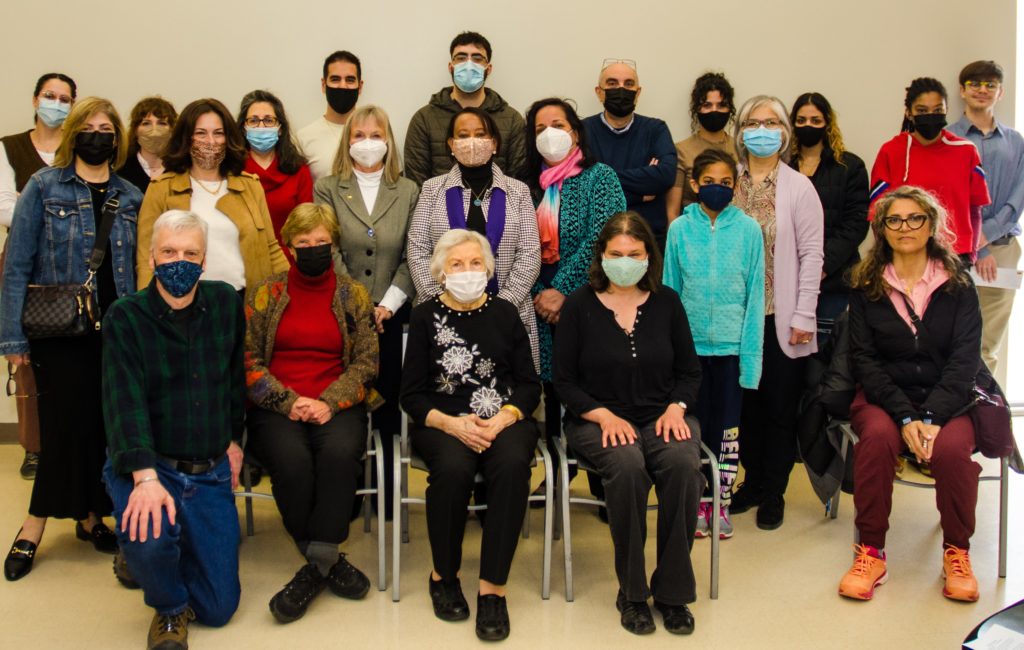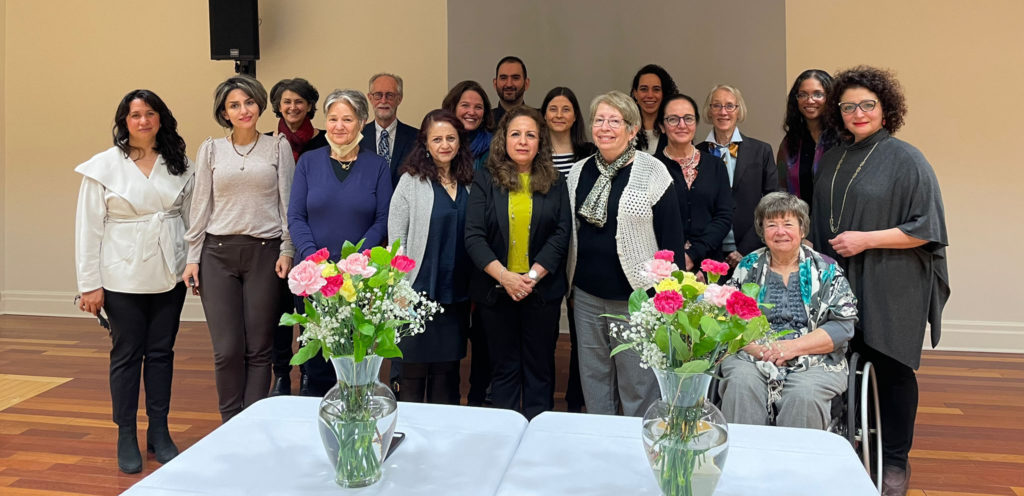Two-stage election process initiated in Ottawa and Toronto
Two localities are the first in Canada to elect their Local Spiritual Assemblies in a two-stage process. The Spiritual Assemblies of Ottawa and Toronto contributed information for this article. It also includes comments made by community members who attended the elections.
In its 30 December 2021 message, the Universal House of Justice described a two-stage election process for Local Spiritual Assemblies: “Similar in many respects to the election of a National Spiritual Assembly, it involves the division of a locality into units from each of which one or more delegates are elected, after which the delegates elect the members of the Local Assembly.”
The message continues: “As the number of Bahá’ís residing in a locality grows large and the community’s capacity for managing complexity increases, the case for implementing a two-stage electoral process becomes commensurately stronger.”
In its message to the Feast of Dominion, the National Spiritual Assembly announced, “[A]t Ridván 2022, the two communities of Ottawa and Toronto became the first to elect their Local Spiritual Assemblies in this manner,” linking the development to growth, as “[t]hese communities are also the first two clusters in Canada to be within clear reach of winning their goal of 1,000 core activities.”
 Ottawa believers in unit 7 gathered to carry out the historic first part of the two-stage election of its Local Spiritual Assembly. There were seven locations across the city.
Ottawa believers in unit 7 gathered to carry out the historic first part of the two-stage election of its Local Spiritual Assembly. There were seven locations across the city.
Ottawa
The news of the implementation of a two-stage election process brought much joy to the hearts of the friends in Ottawa as they recognized this endeavour as a continuation of the pattern where different aspects of Bahá’í community life have been decentralized since 2001, bringing activities closer to where individuals reside.
There were many practical aspects to be arranged in a short period, including consideration of different methods to divide the city into units. In consultation with the Auxiliary Board members and with the guidance of the National Spiritual Assembly, Ottawa was divided using the existing sector geographic boundaries as a foundation to form seven units.
The National Assembly announcement also led to greater efforts to reflect on the sacred nature of the Bahá’í electoral process. Shortly following the Feast, a five-week effort was undertaken to foster conversations regarding Bahá’í elections and the new two-stage process. Among other endeavours, this effort included phone calls, a home visit campaign coordinated by the Auxiliary Board members and their assistants, consultation at two Feasts, deepenings arranged across the city, and the preparation of materials such as a recorded presentation, an infographic and a “frequently asked questions” handout.
In the end, almost 250 friends received and/or made calls or home visits. These steps were accompanied by practical measures in each unit to facilitate voting by friends who were unable to attend the unit meetings, including drop-off points and ballot pick-up services, along with phone voting, e-voting and mail voting.
On April 10, friends in Ottawa gathered in seven locations across the city to carry out the historic first part of the two-stage election of its Local Spiritual Assembly. Each unit elected the allocated number of delegates and the meetings each had between 17 to 29 friends in attendance, enjoying the opportunity to be meeting in person for the first time in a long two years, while following public health guidelines.
Following reverent voting, the tellers retired to another room to count the votes while each site had a program that included viewing the film “Glimpses of a Hundred Years of Endeavour,” reports from core activities within the Unit, joyful live musical interludes, and a study of the 30 December 2021 message of the Universal House of Justice. In some locations, a tie-breaking vote took place before the election could be fully completed.
In total, 19 delegates were elected by the believers in seven units across the city. The Bahá’í community whole-heartedly responded to the call to participate in this new two-stage process. The overall election participation rate across the city was 46 percent, a level of participation not seen in Ottawa since 2010. Two of the units had participation rates of over 50 percent and a third had a participation over 60 percent, all of which are notable in our community of over 1,200 Bahá’ís.
Reflecting on the historic event, Ottawa Bahá’í Cindy Farrell commented: “The first stage was joyous. The friends were enthusiastic and very happy to be called to take part in this special occasion, the first stage in a new electoral process.”
The 19 delegates went on to cast their ballots on April 19 in the second stage of the electoral process to raise up the Local Assembly of Ottawa. The second stage election gathering was arranged at the Bahá’í Centre with voting carried out in a rarefied atmosphere.
 Delegates who participated in-person in the second stage of Toronto’s historic two stage election process, alongside an Auxiliary Board member.
Delegates who participated in-person in the second stage of Toronto’s historic two stage election process, alongside an Auxiliary Board member.
Toronto
With feelings of immense joy, the Toronto Assembly informed the community, on January 26, that as of Ridván this year, the election of the Assembly would be carried out via a two-stage electoral process – a method authorized by the Universal House of Justice, as a feature of the new Nine Year Plan.
This news was immediately seen as historic and was cherished as a collective victory for the community. It confirmed the growth and advances that had taken place in the cluster over the last years, as well as the building of “the community’s capacity for managing complexity.”[1]
Before the friends was the challenge of renewing their effort to “appreciate the sacredness of the electoral process and their duty to participate in it, in an atmosphere wholly free from the taint of suasion or worldly attitudes about power.”[ii]
Beyond practical arrangements, the Spiritual Assembly, in close collaboration with the Auxiliary Board members, was eager to learn how the sacred nature of Bahá’í elections and the associated spiritual principles could be further advanced through a systematic conversation in the community.
Knowing how our awareness of the sacred nature of teaching increases our effectiveness as teachers of the Cause, the friends were invited to consider how their appreciation of the sacred nature of participating in Bahá’í elections might increase their effectiveness as electors.
They were also invited to recall occasions in their lives when they felt the presence of the sacred. For those who had the bounty of pilgrimage they might have memories of bowing down at the Sacred Thresholds. Other examples would include occasions of daily prayers, individual and collective.
To advance this conversation about the sacred nature of Bahá’í elections and the spiritual principles underpinning them, the Assembly organized a home visit campaign that was meant not to replace but enrich the meaningful conversations already taking place throughout the cluster and in neighbourhoods.
The home visit campaign saw about 100 friends arise to reach out to as many households as possible, but with over 1,000 households in the community, the friends were also invited to take steps on their own and some materials were prepared for all to have access to.
Daily online spaces were created to advance the conversation, and some of the core organizational team also had daily reflection spaces during the two weeks when the home visit campaign reached its highest level of intensity.
Folded “postcards” were mailed to all the friends to raise awareness, provide information, and facilitate easy access to the deepening themes. It included a link to a website which is still available at <bahaitoronto.org/election/>.
At a more practical level, the city of Toronto was divided into nine electoral units. Voters were to elect delegates from among the adult believers in their own units who, in turn, would elect members of the Local Assembly from among all the adult believers in the entire city.
Nineteen delegates were elected across the city. Eight units elected two delegates, and one unit elected three delegates. The election of the delegates took place during the weekend of April 9-10. Participation was 28 percent, while the average participation in the previous six years had been around 20 percent.
The second stage of the election took place on April 19. Sixteen delegates attended the meeting in person, while all 19 participated in voting. The gathering was only an election meeting, with no consultative aspect, but full concentration on prayers and the spiritually charged assignment to be carried out.
At the annual meeting, the following night, the results of the election were joyfully shared with the community.
The Assembly and the Auxiliary Board members see this process as an initial step of learning and experience that will help refine aspects of the two-stage electoral process in the coming years.
[1] From the Universal House of Justice to the Continental Boards of Counsellors, 30 December 2021.
[ii] Ibid.
Category: Elections, Features, Institutions








